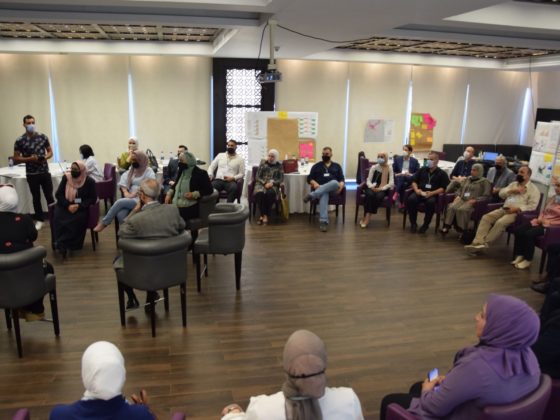On March 3, Tam Nguyen gave the first talk of the eighth annual World Water Events, a collaboration between the Global Water Initiative and the Darden Business School. Nguyen is the global sustainability officer of The Bechtel Corporation and president of bechtel.org, the company’s social enterprise. He formulated Bechtel’s sustainability strategy and leads its implementation. He also heads new corporate initiatives, as well as stakeholder and policy planning on climate change, human rights, and economic inclusion. He holds a doctorate in business administration and two masters’ degrees in international development and international business. Nguyen talked to us about “The Business of Water,” as water is an issue that cuts across many of the core activities of The Bechtel Corporation. We caught up with him afterward.
Let’s talk about the “Business of Water” and its link to sustainability. During your talk you mentioned that when you were hired for the position as sustainability officer, you said you “wanted to work yourself out of a job.” What did you mean by this, and how does it relate to the “Business of Water”?
Water touches all our business lines: energy, infrastructure, mining, and nuclear security. Much of our focus is on industrial uses of water. Sustainability is core to how we work with customers and stakeholders to source and manage its use. Depending on where we operate, we may confront a myriad of human, technical, and climatic issues that are often interdependent—like water scarcity or the competing demands of industrial processes and community access. Having “contextual intelligence” is key to generating the best alternatives to reach a net-zero water use. We may have the best engineering solutions, but they need to fit the unique social, economic, and environmental circumstances in which we operate. Bechtel has a number of tested, proven, and scalable sustainable interventions, like circular approaches to recycling and repurposing.
Working myself out of a job is more figurative than literal. It’s my belief that sustainability does not rest with one person or function. Corporate functions, services, and business units need to own it, and the more they own it, the more they can drive innovation to evolve it. This was the basis of our enterprise sustainability strategy. My role is more of an intrapreneur—to help these business groups develop new initiatives that keep moving the company forward, because sustainability is never static, nor should it be.
Public Private Partnerships (PPPs) where the public and private sector collaborate to provide public services (energy, transportation, electricity, water) have received a fair amount of attention in recent years, including as they relate to the water sector. On the one hand, we have seen a push for more private-sector involvement (sometimes supported by international organizations such as the World Bank). On the other hand, we sometimes see operations in the other direction, such as the re-municipalization in French cities (Paris, Grenoble) where water and wastewater treatment were brought back 100% in the public sphere. What are some of the lessons from your perspective?
There are many lessons. Red flags that may relate, for example, to poor governance or political influence can sometimes be latent or subtle, or appear unrelated, but their culmination can significantly affect the course of the project. Global events like regional financial crises or environmental justice movements can impact and magnify local issues in unexpected ways, and it’s important to understand their potential effects on the structure and durability of the partnership and project. Will a project still be viable, for example, in the wake of a financial crisis? Scenario planning and the increasing power of artificial intelligence (AI) tools that can bring in information (through tools like surveys) about the social, political, and economic contexts of the projects under consideration can more effectively inform decision processes and mitigation measures. This is the contextual intelligence I referred to earlier. Also, using water tariffs to pay all of the Capex (capital expenditure) and Opex (operational expenditures) is a slippery slope, and I think there are many painful lessons here. Pushing the burden of paying for water on low-income consumers is especially complex and risky in developing countries.
Around this time about 10 years ago, Japan was hit by an earthquake and a devastating tsunami. Bechtel Corporation has lent its technical expertise to the cleanup of the resulting nuclear disaster at the Fukushima Daiichi Nuclear Power Plant. The tsunami had impaired the plant’s cooling system and caused nuclear meltdowns, hydrogen explosions, and the release of radioactive contamination. What makes Bechtel well fit to address such a challenge?
We have a long relationship with Japanese and US nuclear security. We’ve offered our expertise to help governments securely decontaminate and decommission nuclear and chemical weapons and materials. This includes chemical weapons demilitarization projects, commercial and US Navy nuclear reactor services, procurement and project management, and environmental restoration and recovery. Bechtel has more than 50 years of experience helping to make the world cleaner and safer, and there is an inherent trust in this experience to tackle big, complex sustainability challenges.





